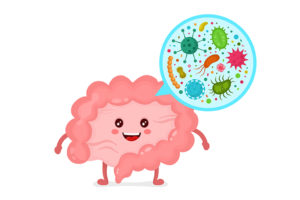
Gut health has become a prominent focus in 21st century health care.
The human body has more bacteria cells than human cells, and recent clinical research links an imbalance of bacteria in the gut microbiome (“good” vs “bad” bacteria) to almost every chronic disease—including obesity, diabetes, autoimmunity, depression, cancer, heart disease, fibromyalgia and asthma.
Research also reveals that people with lower amounts of “good” intestinal bacteria had increased fat tissue, insulin resistance, high cholesterol and general inflammation when compared with individuals who have a healthy gut microbiome.
In addition to the ecosystem inside the gut, the intestinal wall itself houses nearly 70 percent of the body’s immune system.
The lining of our intestinal wall is only one cell layer thick, and therefore very susceptible to damage. If that barrier breaks down, due to infection, medication, food allergens or toxins, the body’s immune system is compromised, which can also lead to chronic disease.
The gut also contains more neurotransmitters than the brain, and the two organs are highly connected.
If messages are altered for any reason in any direction—from the brain to the gut or the gut to the brain—you’ll experience health concerns.
At STR!VE, we talk with members about the link between gut health and chronic disease, and use evidence-based lifestyle management strategies as the first and primary method for prevention and treatment.
Lifestyle factors that can damage your gut microbiome
- Processed foods and a nutrient-poor diet
- Chronic stress
- Overuse of medications such as steroids, anti-inflammatories, antibiotics and acid blockers
Actions you can take to improve your gut microbiome
- Replace processed foods, sugars and refined carbohydrates with fiber-rich whole foods
- Aim for 75 percent of your plate to be plant-based foods and vegetables
- Eat fermented foods that contain good amounts of probiotics such as miso, kimchi, sauerkraut and tempeh
- Consider a 30-day elimination diet to pinpoint trigger foods
 /a>
/a>
 /a>
/a>
 /a>
/a>
Yes, yes yes!! So very happy to see this information becoming more main stream. I’m in the midst of watching the Interconnected Series: the Power to Heal from Within. It is all about the human microbiome, the raging battle and the solutions. Go STR!VE Go!!
Thank you Teresa!